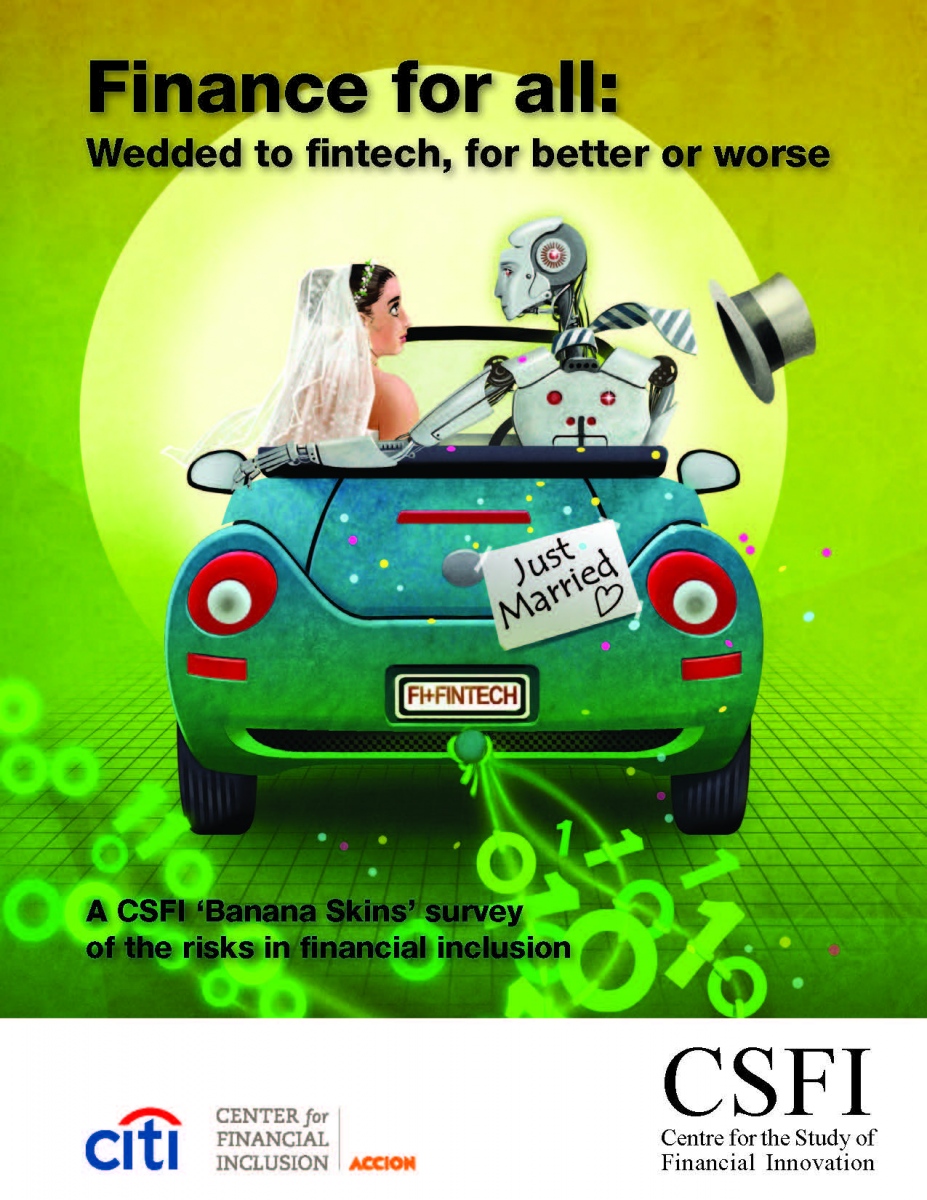F inance for All: Wedded to Fintech for Better or Worse, examines risks (or banana skins) in the provision of financial services to people in emerging markets who have little or no access to these services. Based on a survey of over 300 practitioners and close observers of the industry in 70 countries, the report finds that new technology is delivering considerable benefits to the financial inclusion market – but is also creating new risks that service providers need to manage if they are to succeed.
inance for All: Wedded to Fintech for Better or Worse, examines risks (or banana skins) in the provision of financial services to people in emerging markets who have little or no access to these services. Based on a survey of over 300 practitioners and close observers of the industry in 70 countries, the report finds that new technology is delivering considerable benefits to the financial inclusion market – but is also creating new risks that service providers need to manage if they are to succeed.
Major Findings
While technology opens the way to huge growth in the provision of financial services, it is expensive and complex, and contains risks of its own. Chief among these is the risk that providers will fail to understand it effectively and place themselves at risk. It could lead to irresponsible borrowing and debt difficulties as tech helps avail credit to more people. Technology may also attract providers who are more interested in commercial gain than in the social goals of financial inclusion, or those who are unable or unwilling to design products specifically for the excluded.
In addition to technology, the survey also identifies risks that are seen to be rising in this market. Chief among these is political risk, such as interference by government in the form of interest rate caps on loans, debt waivers and subsidised competition. The risk of bad debts is also seen to be growing as the problem of indebtedness among low income populations persists. Weakness in the governance and management of service suppliers continues to be a concern. The risk of crime, particularly fraud, cyber crime and money laundering, is a growing worry.
On a more positive note, risks that are seen to be receding include the state of the global economy thanks to growing signs of recovery, and the availability of funding for financial inclusion services, particularly in the form of impact investing.
Read and download the report
Source: CFI at Accion
F inance for All: Wedded to Fintech for Better or Worse, examines risks (or banana skins) in the provision of financial services to people in emerging markets who have little or no access to these services. Based on a survey of over 300 practitioners and close observers of the industry in 70 countries, the report finds that new technology is delivering considerable benefits to the financial inclusion market – but is also creating new risks that service providers need to manage if they are to succeed.
inance for All: Wedded to Fintech for Better or Worse, examines risks (or banana skins) in the provision of financial services to people in emerging markets who have little or no access to these services. Based on a survey of over 300 practitioners and close observers of the industry in 70 countries, the report finds that new technology is delivering considerable benefits to the financial inclusion market – but is also creating new risks that service providers need to manage if they are to succeed.
Major Findings
While technology opens the way to huge growth in the provision of financial services, it is expensive and complex, and contains risks of its own. Chief among these is the risk that providers will fail to understand it effectively and place themselves at risk. It could lead to irresponsible borrowing and debt difficulties as tech helps avail credit to more people. Technology may also attract providers who are more interested in commercial gain than in the social goals of financial inclusion, or those who are unable or unwilling to design products specifically for the excluded.
In addition to technology, the survey also identifies risks that are seen to be rising in this market. Chief among these is political risk, such as interference by government in the form of interest rate caps on loans, debt waivers and subsidised competition. The risk of bad debts is also seen to be growing as the problem of indebtedness among low income populations persists. Weakness in the governance and management of service suppliers continues to be a concern. The risk of crime, particularly fraud, cyber crime and money laundering, is a growing worry.
On a more positive note, risks that are seen to be receding include the state of the global economy thanks to growing signs of recovery, and the availability of funding for financial inclusion services, particularly in the form of impact investing.
Read and download the report
Source: CFI at Accion